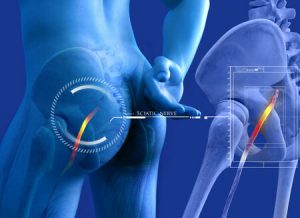
What You Should Know About a Herniated Disc on Your Sciatic Nerve
There are many causes of back pain and often back issues can extend to other parts of the body. While a herniated disc occurs in the back, it can interfere with the sciatic nerve and inflict pain on the lower extremities. It’s worth knowing the mechanics behind this, what symptoms to look for, and what treatment options are available.
What is a Herniated Disc?
Your spine is made up of several bones called vertebrae. There are discs made up of a tough exterior and a soft center to cushion these bones. These discs allow your body to move without your bones rubbing against each other. Sometimes, a disc can be worn out and the soft center protrudes through the disc’s exterior. This is known as a herniated disc. One issue with a herniated disc is it misaligns the spine and no longer provides a proper cushion. However, the damage can go beyond this. The protruding part of the disc can press on other tissue in the body and it can even punch nerves including your sciatic nerve.
What is Sciatica?
Your sciatic nerve begins in your lower back and extends through the buttock and down each leg. Sciatica occurs when pressure is applied to the sciatic nerve by a herniated disc or even an overgrowth of bone. You can experience pain anywhere along the nerve path. In most cases, treatment can clear up symptoms in just a few weeks.
Symptoms
Sciatic pain occurs in the lower back, buttocks, and back of the thigh. Typically, it only affects one side of the body. The pain can be as mild as a dull ache in the affected area or it can be a more severe, shooting pain. Often, the pain increases when coughing or sneezing and it can also be worse after sitting for long periods of time. In addition to pain, you might also experience numbness in your leg or foot. Sometimes, sciatic pain can go away on its own. However, if it worsens or is a prolonged pain, it’s time to seek treatment from a medical professional.
Treatment
Most initial treatment options aim at addressing the symptoms and the pain you experience. Taking medication, such as anti-inflammatory medication and pain relievers, can help to ease the symptoms. Many people also use physical therapy. You can do exercises that will strengthen muscles and bones, improve your range of motion, and even prevent future issues. If your sciatica pain is severe, you may need surgery. Surgeries aim to address the cause of the pain such as removing the portion of the herniated disc that is pinching the nerve. Of course, there are also non-invasive treatments you can use. At the Nerve and Disc Institute, treatment is available that will address the root cause of the problem and use your body’s natural ability to heal itself.
Prevention
Many back issues occur as you age or are the result of injury. Fortunately, you can prevent these issues. Keeping your body in shape and exercising regularly is a great start. Exercise keeps your body strong and flexible which reduces your risk of injuries that can lead to herniated discs and sciatica. If you are overweight, it can put pressure on your spine, which in turn can lead to a herniated disc. Making an effort to lose weight can reduce this pressure and decrease your risk of a herniated disc. Lastly, make sure you are careful with how you use your body. One wrong move while playing sports, for example, can lead to a painful back injury.
A herniated disc is a complicated issue that comes with its own symptoms, treatments, and causes. If a herniated disc presses on your sciatic nerve, it can only complicate things further and lead to more pain. Finding treatment immediately can allow you to get relief from severe pain.
The Nerve and Disc Institute provides treatment that can give you relief and help you get back to your daily activities. Click here to learn more about herniated discs and your treatment options.